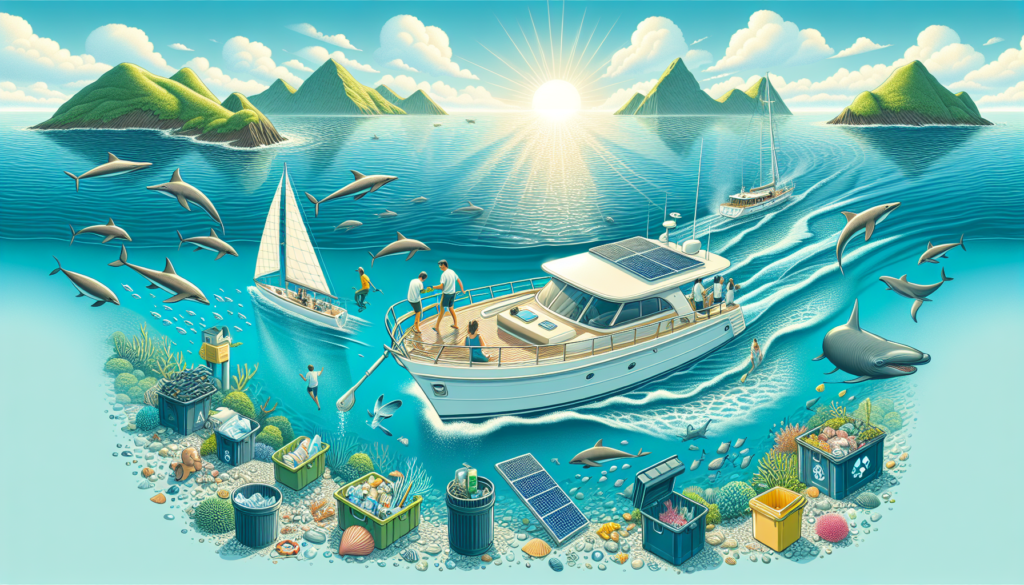Eco-Friendly Boating Practices: Navigating Towards a Sustainable Future
As we sail into the future, the impact of human activities on our planet’s water bodies becomes increasingly apparent. Boating, a popular recreational activity enjoyed by millions worldwide, has its own set of environmental consequences. From fuel emissions to waste disposal, the boating industry contributes to pollution and habitat destruction. However, there is a growing movement towards eco-friendly boating practices that aim to minimize these negative impacts and preserve our marine ecosystems for future generations.
The Importance of Eco-Friendly Boating
Boating is not only a leisure activity; it is also a way of life for many communities around the world. From fishing to transportation, boats play a crucial role in our economy and culture. However, the environmental cost of boating cannot be ignored. Fuel spills, sewage discharge, and marine debris are just a few of the issues that arise from irresponsible boating practices. By adopting eco-friendly measures, boaters can reduce their carbon footprint and protect the delicate balance of our oceans and waterways.
1. Sustainable Boat Design
One of the first steps towards eco-friendly boating is to invest in sustainable boat design. Manufacturers are now producing boats with eco-friendly materials, energy-efficient engines, and innovative hull designs that minimize fuel consumption. By choosing a boat that prioritizes sustainability, boaters can significantly reduce their environmental impact while enjoying their time on the water.
For example, electric boats are gaining popularity as a clean and quiet alternative to traditional gas-powered vessels. These boats are powered by rechargeable batteries, eliminating the need for fossil fuels and reducing emissions. Additionally, solar-powered boats harness the energy of the sun to propel them forward, further reducing their carbon footprint.
2. Responsible Fueling Practices
Fueling up your boat can have a significant impact on the environment if not done properly. Spills and leaks from fuel tanks can contaminate water bodies and harm marine life. To minimize the risk of pollution, boaters should follow best practices when refueling their vessels.
One way to reduce fuel spillage is to use a spill-proof nozzle and absorbent pads to catch any drips or spills. Boaters should also avoid overfilling the tank and make sure that the fuel cap is securely closed after refueling. By taking these simple precautions, boaters can prevent fuel leaks and protect the water quality of our lakes, rivers, and oceans.
3. Waste Management
Proper waste management is essential for maintaining the health of our waterways. From sewage to trash, boaters generate a variety of waste that can harm marine ecosystems if not disposed of responsibly. To minimize their environmental impact, boaters should follow the principles of “leave no trace” while out on the water.
One way to reduce waste is to use biodegradable cleaning products and toiletries on board. These products break down naturally in the environment, reducing the accumulation of harmful chemicals in water bodies. Boaters should also dispose of their waste properly at designated facilities and recycling centers to prevent pollution and habitat destruction.
4. Wildlife Conservation
Boaters share their aquatic spaces with a diverse array of wildlife, from fish to seabirds. It is essential to minimize disturbances to these creatures and protect their habitats while enjoying boating activities. By following wildlife conservation guidelines, boaters can ensure that their presence does not harm local fauna and flora.
One way to protect wildlife is to observe no-wake zones and speed limits in sensitive areas. These regulations help prevent collisions with marine animals and reduce shoreline erosion caused by boat wakes. Boaters should also avoid feeding wildlife and keep a safe distance from nesting sites to minimize their impact on local ecosystems.
5. Eco-Friendly Navigation
Navigation plays a crucial role in safe and sustainable boating practices. By using eco-friendly navigation tools and techniques, boaters can reduce their energy consumption and prevent accidents on the water. From electronic charts to wind-powered propulsion, there are many ways to navigate responsibly while minimizing the environmental impact of boating.
One innovative solution is the use of solar-powered navigation lights, which rely on the sun’s energy to guide boaters safely through the water. These lights are energy-efficient and environmentally friendly, reducing the need for traditional battery-powered lighting systems. By embracing these eco-friendly technologies, boaters can navigate with confidence while protecting the environment.
6. Community Engagement
Community engagement is essential for promoting eco-friendly boating practices and raising awareness about the importance of environmental conservation. By participating in clean-up events, educational programs, and advocacy campaigns, boaters can make a positive impact on their local waterways and inspire others to follow suit.
One example of community engagement is the Great Lakes Beach Sweep, an annual event where volunteers clean up beaches and shorelines around the Great Lakes. This initiative helps remove marine debris and raise awareness about the importance of keeping our water bodies clean. By getting involved in these types of activities, boaters can contribute to a healthier environment for all.
7. Policy and Regulation
Policy and regulation play a vital role in shaping the future of eco-friendly boating practices. Governments and regulatory agencies have the power to enforce environmental standards, promote sustainable technologies, and protect marine habitats from degradation. By advocating for strong policies and supporting eco-friendly initiatives, boaters can help create a more sustainable future for our waterways.
One example of effective policy is the Clean Vessel Act, which provides funding for the construction of pump-out stations and sewage disposal facilities for boaters. This legislation helps prevent sewage discharge into water bodies and promotes responsible waste management practices. By complying with these regulations and supporting similar initiatives, boaters can contribute to a cleaner and healthier environment.
Expert Opinions
According to marine biologist Dr. Jane Smith, “Eco-friendly boating practices are essential for protecting our oceans and waterways from pollution and habitat destruction. By adopting sustainable technologies and responsible behaviors, boaters can enjoy their time on the water while minimizing their environmental impact.”
Common Misconceptions
One common misconception about eco-friendly boating is that it requires sacrificing comfort or convenience. In reality, many sustainable boating practices are easy to implement and can enhance the boating experience. From electric propulsion systems to biodegradable cleaning products, there are numerous eco-friendly options available to boaters today.
Comparative Analysis
When comparing traditional boating practices with eco-friendly alternatives, the benefits of sustainability become clear. Eco-friendly boats are often quieter, cleaner, and more cost-effective to operate than their gas-powered counterparts. By investing in green technologies and adopting responsible behaviors, boaters can enjoy a more enjoyable and eco-conscious boating experience.
FAQs
Q: How can I reduce my carbon footprint while boating?
A: You can reduce your carbon footprint by investing in an electric or solar-powered boat, using biodegradable products, and following best practices for fueling and waste disposal.
Q: What are some eco-friendly navigation tools I can use?
A: Some eco-friendly navigation tools include solar-powered lights, electronic charts, and wind-powered propulsion systems.
To Wrap Things Up
In conclusion, eco-friendly boating practices are essential for protecting our oceans and waterways from pollution and habitat destruction. By embracing sustainable technologies, responsible behaviors, and community engagement, boaters can enjoy their time on the water while minimizing their environmental impact. Let’s navigate towards a greener future together!



